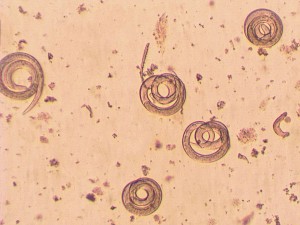Worming
There are two broad categories of worms that may affect our pet dogs and cats, intestinal worms and heartworms.
Intestinal Worms
 Worming is one of the first health care issues pet owners need to address as pups and kittens are the most susceptible. As their name suggests, intestinal worms are parasites that live inside your pets intestines. These worms range in size from small to surprisingly large (up to 18cm in length). Regardless of their size however, they all have negative, and potentially deadly effects.
Worming is one of the first health care issues pet owners need to address as pups and kittens are the most susceptible. As their name suggests, intestinal worms are parasites that live inside your pets intestines. These worms range in size from small to surprisingly large (up to 18cm in length). Regardless of their size however, they all have negative, and potentially deadly effects.
Most species of animal, as well as humans, can be infected with intestinal worms including dogs, cats, rabbits, horses, fish, birds and reptiles.
Common intestinal worms in Australian pets are:
- Roundworm
- Tapeworm
- Whipworm
- Hookworm
If your dog or cat has a large number of worms it may find it difficult to maintain body condition and it can lose weight. In some cases it can cause vomiting, diarrhoea and even anaemia (a low red blood cell level). Occasionally, heavy intestinal worm burdens can cause death.
Worms sometimes have complex lifecycles which involve a period of existence and development outside your pet. Understanding the life cycle of a specific worm is important so that strategies for treatment and prevention can be designed and implemented. For instance, some tapeworms need to pass through fleas to complete their lifecycle, so flea prevention is an important method of controlling tapeworms.
It is important to maintain a routine worming treatment for your pets, to reduce the incidence of infection and to reduce environmental contamination. There are many worming treatments available for the various worm infections that occur in our pets. These are available as tablets, spot-ons, or pastes. Re-infection is a common problem, particularly in dogs or cats that are in contact with a heavily contaminated environment. Another very important reason to worm your dogs and cats is to protect your family; as children in particular can become infected with certain dog worms.
Below are some tips to consider regarding worm prevention:
- Promptly clean up dog faeces
- Practice good hygiene, always encourage children to wash their hands regularly (especially after playing in dirt or sandpits, playing with pets or prior to eating)
- Prevent children from playing where the soil may be contaminated
- Keep your pets environment clean
- Always dispose of dog faeces in public parks and playgrounds
Please call us to discuss intestinal worm prevention for your pet.
Heartworm
Heartworm is a parasitic worm that is transmitted by mosquitoes and infects dogs, cats and even ferrets. This means your pet does not even need to be in contact with other pets to become infected!
When an infected mosquito bites a pet it injects a larval stage of the worm under the skin. These larvae grow into an adult worm and migrate through the body to the heart and blood vessels of the lungs. The pets’ body reacts to these worms being in the body leading to damage to the lungs. The severity of the disease depends on the how much lung tissue is damaged and how a pets’ immune system responds.
Treatment in dogs can be very long and complicated with ongoing medications. There are no drugs approved for treatment of heartworm in cats, so prevention is far better.
How do I check my pet for heartworm?
A blood test for heartworm can be performed at Mt Helena Vet. Tests for dogs are very accurate and results are often available before you leave the clinic. Testing for cats however is less accurate as they often have lower numbers of worms. Further tests may be required for diagnosis.
How do I protect my pet from heartworm?
There are many products available for heartworm prevention. The best option is one that suits your lifestyle and is the most convenient and thereby safest for your pet. A ‘Once a year heartworm injection’ known as Proheart is available at Mt Helena Vet and will remove the risk of you forgetting daily or monthly dosing.
Please call us to discuss the best heartworm prevention for your pet.
